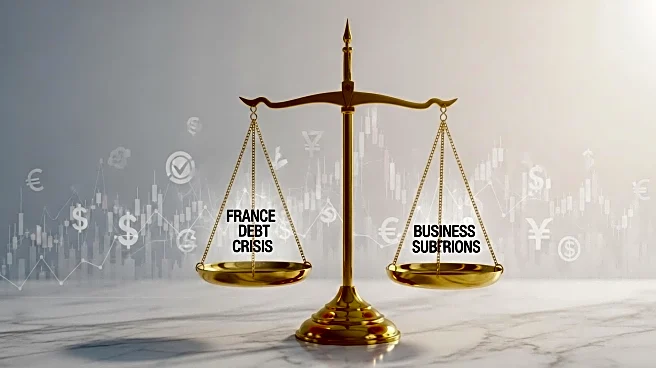What's Happening?
France is grappling with a significant debt crisis, with its national debt reaching 114% of GDP and a budget deficit of 5.8%. Despite high government spending and tax receipts, public services are perceived to be in decline, leading to dissatisfaction among citizens. The French government spends €211 billion annually on business subsidies to create jobs, which is more than its education budget. This spending is intended to address the rigid labor market, where letting go of workers is difficult and costly, resulting in businesses being hesitant to hire. The debate over France's finances is intensifying, with the centrist Prime Minister François Bayrou proposing cuts to find €44 billion in savings, while the left argues for taxing wealth. The far-right blames immigration for the strain on social services. A confidence vote on September 8 threatens to bring down the current government.
Why It's Important?
The debt crisis in France highlights the challenges of balancing economic growth with fiscal responsibility. The substantial subsidies for businesses reflect an attempt to stimulate job creation in a rigid labor market, but they also contribute to the unsustainable levels of debt and deficit. The debate over financial strategies could impact France's economic stability and influence its role within the European Union. The outcome of the confidence vote could lead to significant political shifts, affecting policy decisions on taxation, public spending, and economic reforms. The situation underscores the need for a comprehensive approach to address economic disparities and improve public services.
What's Next?
The upcoming confidence vote on September 8 is a critical juncture for the French government. If the vote results in a loss of confidence, it could lead to political instability and potentially a change in leadership. This may prompt a reevaluation of current economic policies, including the controversial business subsidies. Stakeholders, including political leaders and economic analysts, will be closely monitoring the situation to assess its impact on France's economic future and its position within the EU. The debate over financial strategies is likely to continue, with potential implications for public policy and economic reforms.
Beyond the Headlines
The debt crisis in France raises broader questions about the sustainability of economic models that rely heavily on state intervention. The French approach to business subsidies reflects a larger trend of government involvement in the economy, which is increasingly relevant in a global context where nations like China and the US are adopting similar strategies. The situation also highlights the need for the EU to adapt to a changing geopolitical landscape, where power dynamics are shifting away from traditional rules-based systems. France's ability to influence EU policy may depend on its economic performance and political stability.










